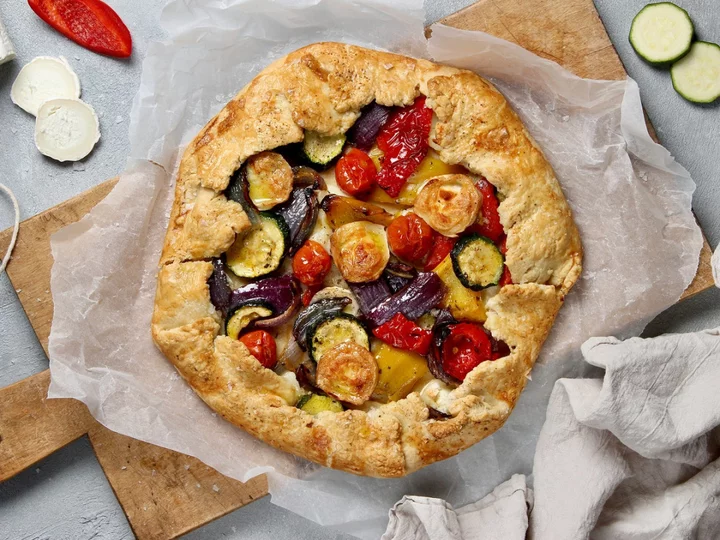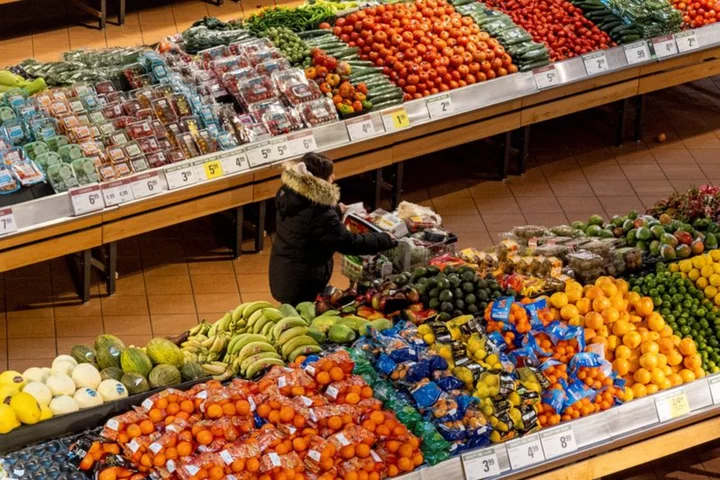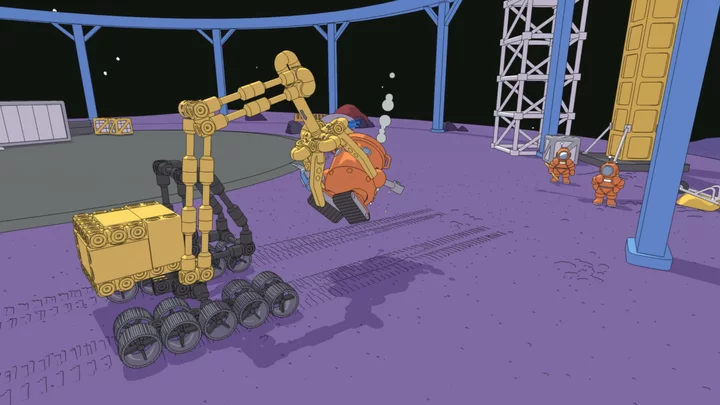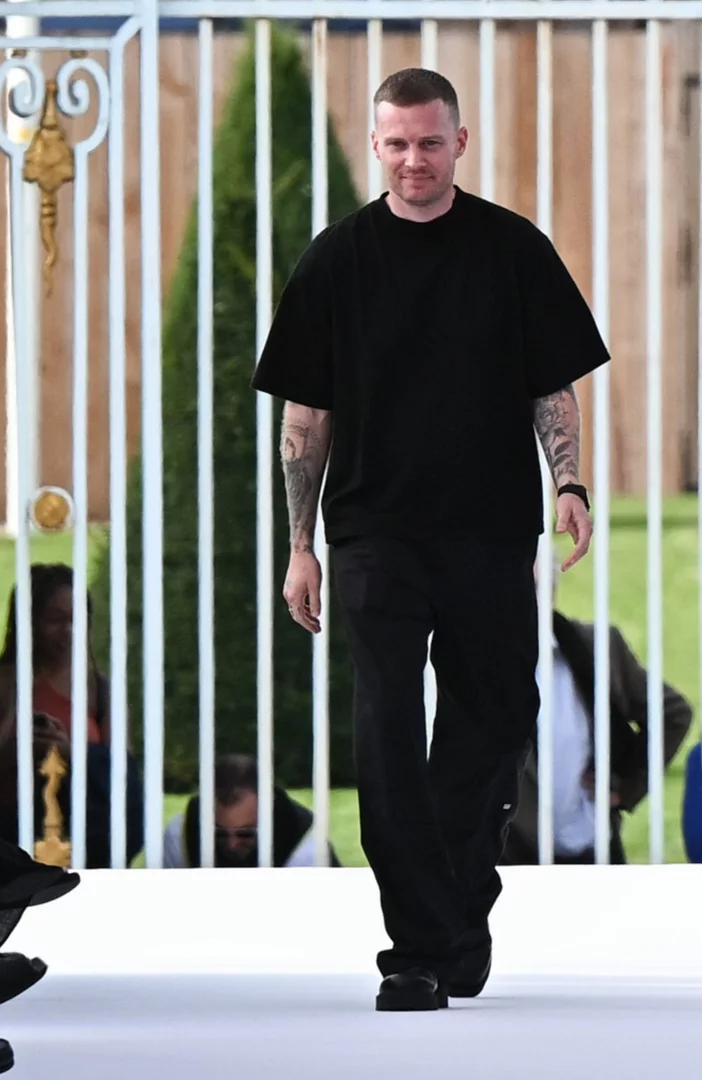
Three meat-free dishes to try this National Vegetarian Week
National Vegetarian week (15-21 May) is the perfect excuse to give these stunning meat-free dishes a whirl. Full of texture, flavour and colour, you won’t feel like you’re missing out. Mediterranean vegetable and goat’s cheese galette Makes: 1 x 10 inch pie Ingredients: 300g plain flour 150g salted butter, cubed 3 tbsp cold water 1 packet of prepared Mediterranean vegetables (400g) or a mix of fresh – chopped into chunks 150g soft goat’s cheese, cut into slices 1 egg Salt and pepper Method: 1. Preheat the oven to 200C (fan). 2. In a large mixing bowl, rub the flour and butter with your fingers until a crumb consistency is achieved. Add the water and stir together to form a pastry dough. 3. Tip the dough out onto the lined baking tray and roll out into a large oval/circle shape (2-3mm thickness). 4. Arrange a layer of goat’s cheese slices in the centre of the pastry, top with the vegetables and then fold in the edges to encase everything. Place a few additional goat’s cheese slices on top of the vegetables. 5. Beat the egg and use a pastry brush or your finger to egg wash the folded pastry edges before seasoning the whole galette with salt and pepper. 6. Bake for 30 minutes until the pastry is golden, allow to cool slightly and serve. Red pesto and parmesan dough knots Makes: 8 knots Ingredients: 1 packet fast action dried yeast (7g) 220ml warm water 400g strong white bread flour 1 tbsp white sugar 1 tsp salt ½ jar red pesto 170g cheese of choice, we recommend parmesan Method: 1. Preheat the oven to 180C (fan). 2. In the measuring jug, combine the warm water and yeast. Stir and set to one side for 2-3 minutes to activate the yeast. 3. In a large mixing bowl, combine the flour, sugar and salt. Pour in the yeast and water and stir them together with your hand to form a dough. 4. Sprinkle your worktop with a little flour and knead the dough until smooth, then return to the large mixing bowl, cover and leave in a warm place for at least 15 minutes to prove (this is where it will start to grow in size). 5. Using your fist, knock the dough back (this means push the dough back down to its original size) and tip out onto a floured worksurface before rolling into a large rectangle shape (about 5mm thickness). 6. Spread the red pesto on half of the rectangle, grate a thin layer of cheese on top and then fold the over half of the dough over the pesto and parmesan. 7. Cut the dough into 1 inch wide strips, then, holding each end, twist and knot each one before placing onto a lined baking tray. 8. Bake for 15-20 mins until risen and evenly browned then remove from the oven, allow to cool slightly, grate more cheese on top and serve. Savoury crêpes Makes: 6 crêpes Prep time: 5 mins | Cook time: 30 minutes Ingredients: 2 large eggs 200ml milk 120g plain flour Butter for greasing pan For the fillings: Grated cheese and mushrooms (sliced and pan fried in butter – but these can be made with any filling of your choice!) Method: 1. In the large mixing bowl, combine the eggs, milk and flour with the whisk to form a runny batter. 2. Place your pan over medium heat and grease lightly with butter before spooning in about 2-3 tbsp of batter and swilling it around to form a thin, even crêpe. 3. Return the pan to the heat and leave to cook for 30 seconds, then using the spatula, or flipping if you feel confident to, flip the crêpe over and cook the other side for a further 30 seconds. 4. Place the crêpe on a plate and repeat steps 2 and 3 until all of the batter has been used, stacking them up as you go. 5. To fill, take one of the crêpes, place it back in the pan and sprinkle with grated cheese and mushrooms. Leave for 30 seconds, then fold the crêpe in half and then half again to create a quarter fold. Flip the whole thing over to brown the other side lightly and ensure all the cheese has melted, then serve. Recipes from the Easy Peasy Baking campaign. You can find more recipes and information on the campaign on fabflour.co.uk/easy-peasy-baking. Read More How to make TikTok’s viral whole roasted cauliflower What is coronation chicken? The story of the royal recipe and how to make it Healthy lemony smoked salmon pasta that takes zero effort Easy coronation chicken pie recipe chosen by Mary Berry Andi Oliver on turning 60 and channeling her anger into power Andi Oliver: Earl Grey tea bags are a gamechanger for barbecue chicken
2023-05-16 19:57

Canada plans to amend competition laws to control rising food prices
Canada plans to amend its competition laws to enable the regulator to act against anti-competitive mergers in the
2023-09-16 04:18

Can Apple make us love virtual reality? | You Ask The Questions
Apple has announced a new virtual reality headset, the Vision Pro, which allows people to project any image into the space around them, from widescreen movies to emails. The Vision Pro's USP is that these images remain in your real life landscape, as opposed to sweeping you entirely from your surroundings - so you're less likely to bump into the kitchen table when you're exploring Apple's augmented world. So far virtual reality headsets have failed to hit the mainstream, does Apple have what it takes to make these often nausea-inducing neck strains user-friendly? Sign up for our newsletters.
2023-06-10 00:17

‘You can forget about that’ – Max Verstappen rules out another win in Singapore
Max Verstappen said he can forget about extending his record winning streak after qualifying only 11th for Sunday’s Singapore Grand Prix. On a wild night under the 1600 bulbs that light up the Marina Bay Circuit, Aston Martin’s Lance Stroll also walked away from a staggering 110mph shunt, while Ferrari’s Carlos Sainz pipped the Mercedes of George Russell to land his second pole position in as many races. Charles Leclerc will start third ahead of Lando Norris and Lewis Hamilton. But it was the demise of Red Bull – the unbeaten tour de force of this most one-sided of seasons – that left those here in shock and awe. Verstappen’s team-mate Sergio Perez also failed to reach Q3. He will line up in 13th for Sunday’s 62-lap race. Verstappen warned earlier this week that the Red Bull machinery which has carried him to a record 10 consecutive victories would not be suited to this unique 3.07-mile high-downforce circuit. Yet, nobody could have foreseen him being sent for an early bath along with Perez in the other car. Verstappen was straight on the radio to express his dismay. “I don’t know if you saw that, but that was just f***** shocking,” he said. “Absolutely shocking experience.” Verstappen’s Red Bull team, without a defeat in the 14 rounds so far, now face an improbable task of making history by becoming Formula One’s first ‘Invincibles’. “You can forget about that (a victory),” said Verstappen. “I don’t want it to sound too dramatic but it has been a tough weekend, and it is a long, long time since it has been like this in qualifying.” Verstappen last started this far back in Saudi Arabia when a driveshaft failure consigned him to 15th at the second round in March. He finished runner-up to Perez. But the streets of Singapore, unlike those in Jeddah, are strenuous to overtake on. Indeed, eight of the last 13 races here have been won from pole. “You cannot pass here,” added Verstappen. “You need to be one and a half, to two or three seconds faster than the car in front which we are not. It will be a very tough and long afternoon. I am confident the car will be fast again in Suzuka next weekend Max Verstappen “On other tracks you can start last and win, but not in Singapore. I want to win, but when it is not possible you have to accept that. “I knew there would be a day that I wouldn’t win. I had a really good run up until now. “And I would always take a season where we are winning as much as we have, and have one really bad weekend, over the other way round when you are not fighting for the championship. I am confident the car will be fast again in Suzuka next weekend.” Red Bull’s sudden malaise cleared the way for Sainz to capture another pole, a fortnight after he secured top spot in qualifying in Monza. However, Russell ran the Spaniard close, finishing just 0.072 seconds back, and the Englishman believes he has a strong chance of landing Mercedes’ first win of the campaign and the second of his career. The Silver Arrows have also followed a unqiue strategy this weekend that leaves Russell with an extra set of medium tyres which could provide him with the tactical edge over Sainz. “George has a really good shot at winning and I really hope he does,” said team-mate Hamilton, who qualified half-a-second back on disappointing evening for the seven-time world champion. “I hope he gets a good start and gets ahead of the Ferraris. That would be amazing for him and for the team. “For me, I will see what I can do. If I get further up then great. I changed the car last night and I don’t know what is going on with it. It is the hardest car I have ever driven to get right.” Read More Charity boss speaks out over ‘traumatic’ encounter with royal aide Ukraine war’s heaviest fight rages in east - follow live Lance Stroll cleared to race in Singapore after high-speed qualifying crash Lance Stroll crashes into barrier at 110mph in Singapore Grand Prix qualifying Max Verstappen struggles in Singapore practice under the lights
2023-09-17 01:19

A 1-year Sam's Club membership is $25
TL;DR: As of September 17, get this Sam's Club 1-Year Membership for Only $24.99 with
2023-09-17 17:23

'Mars First Logistics' is a physics simulator game that made me appreciate my thumbs
Have you ever pondered upon the beauty of the opposable thumb? Jutting from the palm
2023-08-14 17:52

'Today' fans send best wishes to Al Roker's son Nick as NBC host and wife Deborah Roberts drop him off at college
Al Roker celebrated his 69th birthday over the weekend and later took his son back to college for his sophomore year
2023-08-21 17:53

US imposes visa restrictions on Uganda officials after anti-LGBTQ law
WASHINGTON The United States has imposed visa restrictions on Uganda officials after the African nation passed an anti-LGBTQ
2023-06-17 02:25

Power up your productivity with a 2021 Apple iPad at an all-time low price
SAVE $80: As of October 26, the 2021 Apple iPad (WiFi, 64GB) is on sale
2023-10-26 23:15

Olivia Dunne: Gymnast rocks in classy silver dress at ACM Awards
With a thigh-high slit and a cinched waist, Olivia looked like a true bombshell
2023-05-12 18:00

Senators: We Need a New Agency, Not Just an Executive Order, to Rein in AI
Throwing a new office at an old problem may look like a profoundly Washington response.
2023-11-01 09:54

Transgender Mississippi girl misses graduation after judge's ruling
By Timothy Gardner A transgender Mississippi girl declined to participate in high school graduation on Saturday after a
2023-05-21 04:25
You Might Like...

F1 calendar: Every Grand Prix race this season

Bose QuietComfort Headphones Review

Memorial Day Travel Boost to Stoke Demand for Gasoline and Jet Fuel

'The Burning Girls' trailer teases a small village with a terrible past

Matthew Williams quits as creative director of Givenchy

Is Michael Strahan moving to the fashion industry? ’GMA' star unveils clothing line amid absence from show

This refurbished tablet-laptop hybrid is under $400

Farmers across Bulgaria protest against Ukrainian grain as EU divide grows
